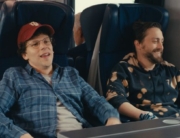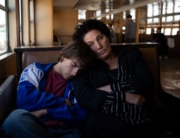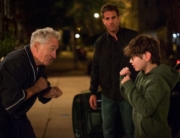A family of four heads in a car for the Iranian borderlands: a fortysomething couple, their quiet and pensive older son, and the boisterous little boy born of their middle age. The family bickers, sings along to old pop songs, and runs into strangers. It becomes apparent, though, that one of the four won’t be coming back. Under this shaggy-dog road trip tale lies a story of flight and escape.
Panah Panahi, son of famed Iranian director Jafar Panahi (3 Faces), has crafted a smart, unsettling mirror in Hit the Road of living under repression, where even within the family circle the truth can’t be spoken. However, comic bits can register uneasily within its framework: Sometimes they work well to offset the heavy mood, but other times land as little more than Little Miss Sunshine–style outbursts of quirky cutesiness.
Bearded paterfamilias Khosro (Hassan Madjooni) broods in the back seat, his leg encased in a massive cast that exposes none-too-clean toenails. His wife (Pantea Panahiha) faces the world with no-nonsense dignity and good cheer, but we sense the pain under her composed exterior. Their son Farid (Amin Simiar) of military age, also broods, with a more deeply sorrowful air than his wisecracking, ironic father. And their younger son (Rayan Sarlak) is an overly lively kid allowed to caper, scream, and spin fantasies that the parents helplessly try to shut down but usually end up indulging. Traveling with them is their dog Jessy, whom the parents know is about to die, an overt and heavy symbol of mortality, offset by the little boy’s nonstop prattle.
Mostly trapped in the car, Khosro and his wife have to hide their various burdens from their child, from strangers, and, one suspects, from each other. Their journey through Iran’s deserts and mountainsides grows more dreamlike as they meet countryfolk, sinister fixers, and even a talkative young man on a bicycle whom they first hit with their car, then take for a ride. Some encounters vibrate with fateful meanings and tension. Others can be deflated with snatches of dialogue like, “Stop the car, Jessy has to pee.”
Shots grow wider and vistas greater as the group burrows deeper into the countryside. The family seems overwhelmed by the enormity around it and the choices it has to face. In a departure from his slice-of-life tone, Panahi partakes in a bit of whimsical fantasy with a scene of the father and little boy floating in space among the stars, a signal that might as well read, SENTIMENTALITY AHEAD. If we sense that the director has become a little too dependent on a smiling-through-our-tears emotional default, the movie ends with—surprise—the family driving, singing, and yes, actually smiling through tears. Perhaps a story without these interludes might have been grim and flinty, but Panahi may have leeched his intelligent, subtle film of some power with a little too much sweet sorrow.

















Leave A Comment